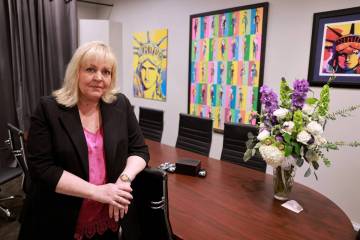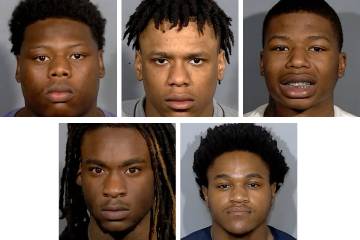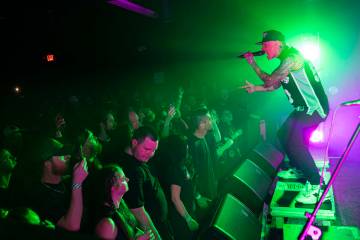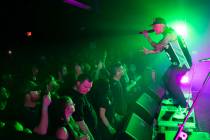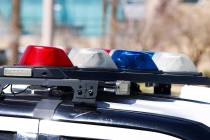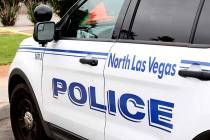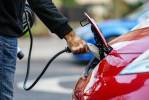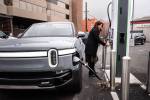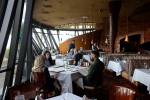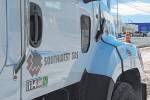Thanksgiving Day in Las Vegas ripe for fires, carbon monoxide
Thanksgiving is a busy day for the Las Vegas Fire Department, and not just because of blazes.
With fires from ovens, stove tops and turkey fryers, Thanksgiving Day results in the most calls for carbon monoxide, Fire Department spokesman Tim Szymanski said. Carbon monoxide, known as the “silent killer,” is a colorless, odorless gas created by burning fuel and open flames. In high doses it is deadly.
“On Thanksgiving Day it’s the stove because all four burners are going and the oven is going, and many houses don’t have a vent in the kitchen that allows that buildup of carbon monoxide to go out,” Szymanski said. “It builds up in the kitchen because people are cooking for five or six hours straight.”
Opening windows and doors every hour to allow in fresh air can help reduce buildup, he said.
More people have installed carbon monoxide alarms in recent years, Szymanski said, leading to more calls in response to the gas. The Fire Department did not need to take anyone to the hospital for carbon monoxide poisoning last Thanksgiving, Szymanski said.
Alarms should be placed in each level of a home, with one in the kitchen and one near sleeping areas, he said.
Carbon monoxide also can build up when people use charcoal grills indoors, a common but dangerous practice used to keep houses warm, Szymanski said. Log and gas-burning fireplaces, if used improperly, can also cause gas buildup.
While hospitalizations caused by the gas have decreased in his department in recent years, Szymanski remembers deadly cases in Las Vegas. He recalled conducting a welfare check on a family, only to find the entire household dead from carbon monoxide poisoning. Wind had blown the gas from a generator into the house through a crack in the garage door.
“There’s no signs or symptoms of carbon monoxide gas,” Szymanski said. “So it overcomes people and they can pass out without warning, and it eventually makes your breathing stop.”
Generators should be placed outside, away from windows, doors and vent openings. Before venturing into the cold, warm cars outside of the garage to avoid the gas. Chimneys can also create carbon monoxide inside if the damper is closed when using the fireplace.
When people are exposed to the gas in low doses, they can experience flulike symptoms, he said.
Fire safety
In the United States, fires caused by cooking are three times more likely to happen on Thanksgiving than any other day of the year, Szymanski said.
The Fire Department has not responded to any significant cooking-related fires on Thanksgiving since 2016, Szymanski said. Last year, the department responded to just a few burnt turkeys in the oven, he said.
“I think everybody was on guard,” Szymanski said. “We’re hoping this is another year where there’s no fires.”
Grease fires on the stovetop should be put out by turning off the burner and placing a cookie sheet or lid on the pan, which cuts of the oxygen supply, he said. Dousing the fire with water can be disastrous, making the flame grow and engulf cabinets and cause serious burns.
Oven fires can be smothered by turning off the heat and keeping the door closed.
If using a turkey fryer, keep the device outside and at least 10 feet from buildings and away from wooden decks or garages. Frozen turkeys should be completely thawed and dry to avoid reacting with the oil, which shouldn’t overfill the fryer, Szymanski said.
If you’re not sure you can put out the fire on your own, call the Fire Department from outside your home.
The department also advised cooks to closely watch food. Don’t leave the room or house when the stove or oven is in use, and don’t cook drowsy to avoid falling asleep and leaving the stove unattended.
As the valley gets colder over the holidays, the Fire Department also urged people to be careful with space heaters, which should be placed at least 3 feet from anything flammable, including people. Heaters should be placed on solid, flat surfaces and should have an auto shut-off function in case it tips over.
People should plug the heaters directly into a wall outlet instead of an extension cord. When you go to bed or leave the room, always turn the space heater off.
Contact Katelyn Newberg at knewberg@reviewjournal.com or 702-383-0240. Follow @k_newberg on Twitter.





